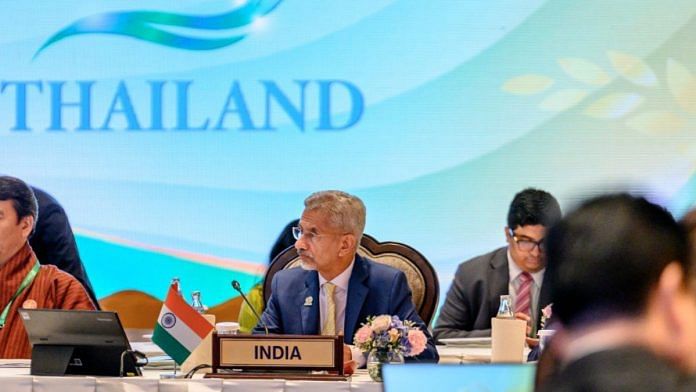Bangkok: Amid the uncertainty over trade unleashed by US President Donald J. Trump’s global tariffs, Indian External Affairs Minister S. Jaishankar Thursday declared that “every region must look out for itself” during his opening remarks at the 20th BIMSTEC ministerial meeting.
“Every region needs to look out for itself, whether it is in food, fuel and fertiliser supply, vaccines or speedy disaster response. We are seeing that unfold before our very eyes. Times have indeed changed. Shorter supply chains and immediate neighbours have a salience much more than before,” said Jaishankar.
He added: “Colleagues, we meet today in the 28th year of the BIMSTEC. And we do so in very uncertain and volatile times, when the global order itself is under visible churn. This should encourage us to approach BIMSTEC from a more ambitious perspective. The new order, whose outlines have only now started to become visible, is intrinsically more regional and agenda-specific.”
The Bay of Bengal Initiative for Multi-Sectoral Technical and Economic Cooperation (BIMSTEC), is holding its sixth leaders’ summit in Bangkok Friday. Indian Prime Minister Narendra Modi will be in attendance.
Before the ministerial meeting, Jaishankar attended the signing of a key maritime pact among the BIMSTEC members—Bangladesh, Bhutan, India, Nepal, Myanmar, Sri Lanka and Thailand—which will see the regional grouping focus on enhancing infrastructure and port facilities to improve maritime trade. The Bay of Bengal is among the least integrated regions in the world.
However, there exists an impetus for change, especially in the current global geopolitical context of Trump’s war on global trade.
The modern international trading system, which has been underpinned by the US for eight decades, was overturned late Wednesday, when the US President announced tariffs on a number of countries, including India, Myanmar, Sri Lanka and Thailand—all members of BIMSTEC. Indian goods will now face a 26 percent tariff, while Thai goods will face a 36 per cent tariff when exported to the US.
The international geopolitical situation is not the only complexity for BIMSTEC members. Ties among the member-states themselves in some instances are quite chilly. India and Bangladesh, for example, have had diplomatic challenges following the ouster of former Prime Minister Sheikh Hasina in August 2024.
Most recently, Muhammad Yunus, the head of the interim government in Bangladesh, raised hackles in New Delhi with his comments on Bangladesh being the “only guardian” of the ocean in the region as India’s Northeast is “landlocked”.
On completing a long-pending transport corridor connecting India, Myanmar and Thailand, the external affairs minister said, “The completion of the Trilateral Highway will connect India’s Northeast all the way to the Pacific Ocean, a veritable game-changer. We are conscious that our cooperation and facilitation are an essential pre-requisite for the smooth flow of goods, services and people in this larger geography.”
The project, however, has faced numerous challenges emanating from the ongoing civil war in Myanmar. The leader of the military junta Min Aung Hlaing will also attend the leaders’ summit Friday and is likely to have a meeting with Prime Minister Modi.
As a part of India’s renewed BIMSTEC vision, Jaishankar batted for more commitment towards the organisation, while also pushing for more connectivity—be it digital, energy, business, maritime and land corridors, health and food security.
The summit will focus on the adoption of the “Bangkok Vision 2030”, which includes a roadmap for the conclusion of negotiations for the BIMSTEC free trade agreement, as governments in the region focus on looking towards themselves, rather than the West, given the current global uncertainties.
(Edited by Mannat Chugh)




